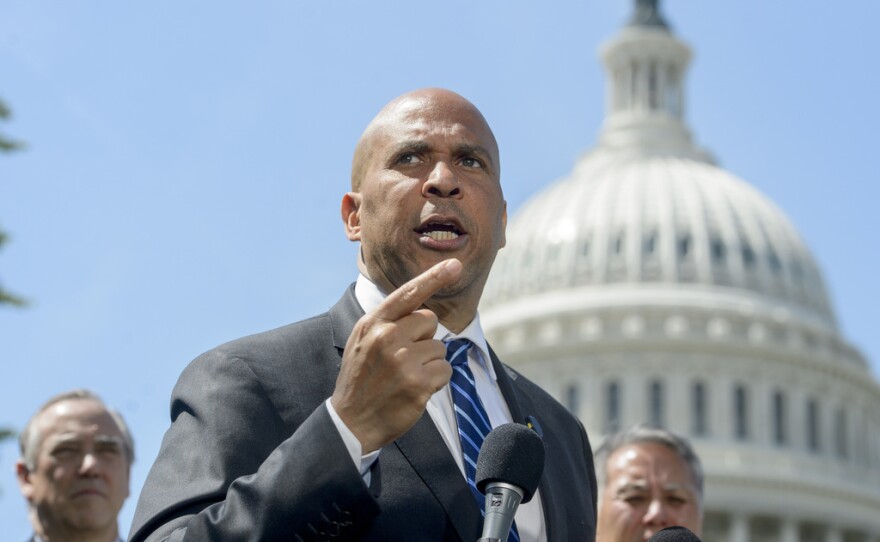Sen. Cory Booker, D-New Jersey, on Thursday visited Imperial Beach to see the Tijuana River sewage pollution crisis and demand stronger federal action to address the issue.
Booker was invited to South County by Imperial Beach Mayor Paloma Aguirre and was joined by Rep. Juan Vargas, D-San Diego.
Even though none of Booker's current committee assignments give him authority over Tijuana River issues, the senator's visit is bringing more media attention to the crisis.
"No one should be forced to breathe toxic air and swim in sewage," Booker said. "What I saw and smelled today in South San Diego County is unconscionable — it would never be tolerated in Malibu or Mar-a-Lago and it shouldn't be tolerated here.
"This is an environmental justice crisis, and thanks to Mayor Paloma Aguirre's relentless leadership, it's finally getting the national attention it deserves. I'm taking what I saw here back to Washington to help make sure this community's fight for clean air and water is heard and answered."
Aguirre once served as an environmental fellow in Booker's Washington office. She invited the senator to make a visit to the border on his already scheduled California trip.
"I fought tooth and nail to get this funding through Congress and fix a broken plant that was making people sick and closing our beaches," Aguirre said. "Now that fight is paying off — and construction is finally moving with real urgency.
"Today's progress is proof that when South County speaks up and pushes hard, we get things done. Our relentless fight is showing results, but we need a 100% solution — because South County families shouldn't have to live with this toxic sewage nightmare any longer."
Rep. Vargas spoke at Thursday's new conference about the ongoing issue.
"The pollution in the Tijuana River isn't just harming our environment — it's threatening our neighbors' health, shutting down businesses, and closing beaches," he said. "This isn't a partisan issue, it's a matter of basic human rights and community safety. We will continue to fight for real solutions and lasting protections."
Booker's visit comes the day after a UC San Diego report found dangerous chemical compounds are present not only in the water of the Tijuana River and off the coast of Imperial Beach, but are also aerosolized by ocean spray and make it into the air.
The paper's lead author, Adam Cooper, collected samples from the air and water at various points along the coast of San Diego County, including the U.S.-Mexico border, Imperial Beach and Scripps Institution of Oceanography in La Jolla. The study was published in Wednesday's edition of Science Advances.
"The Tijuana River region is a very dynamic environment with implications for public health, environmental policy and international relations between the United States and Mexico," Cooper said. "Ours is one of the most comprehensive studies to date investigating water-to-air transfer of these pollutants."
The 120-mile Tijuana River flows from Baja California into the United States and discharges millions of gallons of wastewater — including sewage, industrial waste and runoff — into the Pacific Ocean every day.
The tiny amount of pollutants caused by aerosolized spray can cause health problems. Many residents have complained of respiratory illness, insomnia and headaches, and several San Diego beaches have been closed almost continuously for the last three years because of high levels of bacteria from wastewater runoff.
Aguirre, who holds a master's degree of advanced studies from Scripps Institution of Oceanography, said the study was shocking but validating for South County residents who have sounded the alarm on the pollution for years.
"The study found methamphetamine, cocaine residue, tire chemicals, and toxic compounds from sunscreen floating through the air in South County — chemicals being inhaled by children, workers, and families every single day," she said. "And let's be clear: This study shows with science what working people all know — that the air in South County is more polluted than in La Jolla. That's not just unjust — it's unbelievable and unacceptable.
"We are not second-class communities. We are working people who deserve the same clean air and safe environment as every other neighborhood in this country."
The paper's authors argued there are concrete actions politicians can take to better water and air standards in the area.
"The solutions to the cross-border sewage crisis aren't constrained by technical challenges," Cooper said. "They're constrained by political challenges and policy issues. We have to motivate decision-makers to make the right investments."






